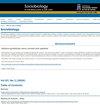大型建筑项目中社会黄蜂数量的波动
IF 0.6
4区 农林科学
Q4 ENTOMOLOGY
引用次数: 0
摘要
由于一些社会黄蜂物种对环境变化很敏感,可以用作生物指标,本研究的目的是分析社会黄蜂在以下阶段的动物群变化:完成之前、期间和之后,以及验证黄蜂作为监测尤兹-德福拉联邦大学植物园种植所产生影响的工具的使用。在2011年和2012年(建设前)、2013年、2014年和2016年(建设期间)以及2019年(植物园建设开放后),通过主动搜索方法对社会黄蜂进行了采样,寻找巢穴和有吸引力的陷阱。这些物种的丰富度和相似性随着时间的推移而变化,可以确定对植物园种植造成的影响具有抗性和敏感性的物种。多年来在同一地区对社会黄蜂动物群进行的研究可以成为监测影响的有效工具;此外,有必要在研究人员和企业管理层之间建立伙伴关系,以减轻指导方针和环境教育造成的影响。本文章由计算机程序翻译,如有差异,请以英文原文为准。
Fluctuation in the richness of social wasps throughout a large construction project
Since some social wasp species are sensitive to environmental changes and can be used as bioindicators, the objective of the present study was to analyze the variation in the fauna of social wasps during the phases: before, during, and after completion, as well as to validate the use of wasps as a tool for monitoring the impacts generated by the implantation of the Botanical Garden of the Federal University of Juiz de Fora. Social wasps were sampled through active searching methods, searching for nests and attractive traps in the years 2011 and 2012 (before the construction), 2013, 2014, and 2016 (during the construction), and 2019 (after the construction and opening of the Botanical Garden). The richness and similarity of the species varied over the years, and it was possible to identify resistant and sensitive species to the impact caused by the implantation of the Botanical Garden. Studies with social wasp fauna conducted over many years in the same area can be an efficient tool in monitoring impacts; in addition, it is necessary to have a partnership between researchers and the management of the enterprises to mitigate the effects caused by guidelines and environmental education.
求助全文
通过发布文献求助,成功后即可免费获取论文全文。
去求助
来源期刊

Sociobiology
生物-昆虫学
CiteScore
1.60
自引率
11.10%
发文量
28
审稿时长
3 months
期刊介绍:
SOCIOBIOLOGY publishes high quality articles that significantly contribute to the knowledge of Entomology, with emphasis on social insects. Articles previously submitted to other journals are not accepted. SOCIOBIOLOGY publishes original research papers and invited review articles on all aspects related to the biology, evolution and systematics of social and pre-social insects (Ants, Termites, Bees and Wasps). The journal is currently expanding its scope to incorporate the publication of articles dealing with other arthropods that exhibit sociality. Articles may cover a range of subjects such as ecology, ethology, morphology, population genetics, physiology, toxicology, reproduction, sociobiology, caste differentiation as well as economic impact and pest management.
 求助内容:
求助内容: 应助结果提醒方式:
应助结果提醒方式:


